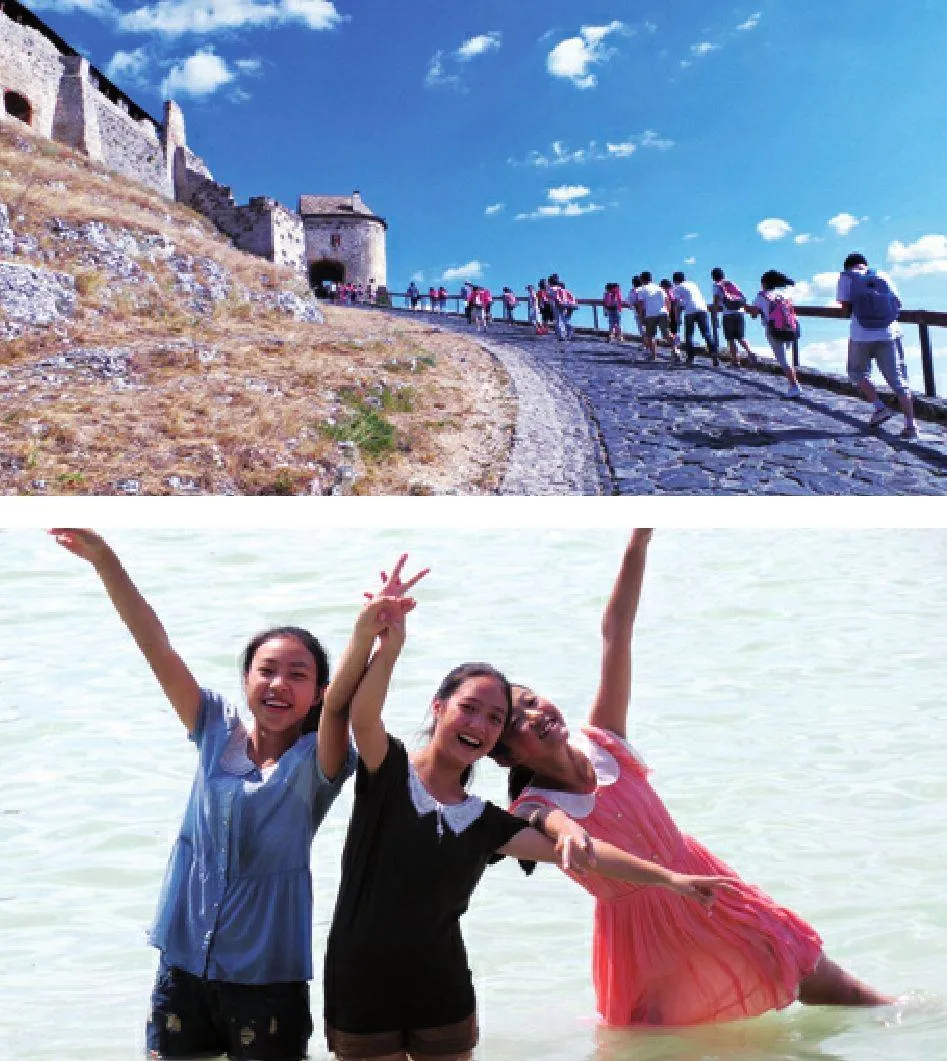Back From hungary
Fifty middle school students in identical white T-shirts sat in a meeting room at Novotel Hotel in Beijing on August 7. They were staring at a big screen displaying pictures of a trip to Hungary they just came back from.
“Do you remember the place where we took this picture?”
“What was the name of this person we met in Budapest?”
The woman displaying the pictures asked questions to which, the students eagerly replied, still full of excitement.
However, the atmosphere was different at a press conference held on July 24, one day before they set off from Beijing. They were introduced via slideshows to the beautiful places they were going to visit and the delicious food they were going to eat with another picture display, but none of them seemed to be excited. When asked about how they felt, one girl even burst into tears.
This difference in attitude is also evidently reflected by the pictures they took together before and after the trip. Before setting off, the students look solemn and nervous, but upon their return the photos are all filled with smiles.
The changes
The students, aged from 12 to 17, all came from areas affected by the 7.0-magnitude earthquake that hit Ya’an City in southwest China’s Sichuan Province on April 20. The tremor claimed the lives of 193 people and injured a further 12,211. The students either came from families that suffered losses or were individuals who acted outstandingly during rescue work.
The invitation from Hungary came from Istvan Ujhelyi, Vice Chairman of the Hungarian Parliament, on April 23 at the China-EU High-Level Political Forum, which was held in Suzhou, east China’s Jiangsu Province, three days after the earthquake.
This is not the first time that Hungary has reached out and helped students from China’s quake-stricken areas. Prompted by Ujhelyi, the Hungarian Government invited affected Chinese students for recuperation in the country after the Wenchuan earthquake in Sichuan in May 2008 and the Yushu earthquake in northwest China’s Qinghai Province in April 2010.
Just as it was for the students of 2008, those students making the trip this year had never left China before.
“I have never even been to any big cities in China, never mind another country,” said 14-year-old Zhang Hongbo, a Tibetan student from Qiaoqi Middle School in Baoxing County.
The Ya’an earthquake damaged Zhang’s family home as well as the road leading to the county seat, which was ruined by a mudslide following aftershocks.
“Knowing that I had the opportunity to go on this trip, my father borrowed a motorbike and carried me from our home in the village to the county seat. It took us more than six hours, almost double what it would have taken before the road was damaged by the earthquake,”Zhang said.
“I never thought I would get a chance to go to another country while I was still in middle school,” said Shu Qianlin, a 17-yearold student from Baoxing Middle school in Baoxing. “This trip has really opened my eyes to many things and I’ve learnt a lot from it.”
“Taking these students out of their hometowns and to a totally different environment gives them a chance to forget about the damage done to them,” said Qi Wei, Senior Program Manager of the China Foundation for Peace and Development, which coordinated the trip.
Qi went on to explain that the itinerary they had planned for the students aimed at helping them with emotional recovery. In a summer camp near Lake Balaton, they participated in swimming, mountain climbing, dancing, painting and other activities. In Szeged and Budapest, the students visited the famous Hungarian Parliament Building and the Fisherman’s Bastion, as well as the Confucius Institute at the University of Szeged. They also paid a visit to the Chinese Embassy in Hungary, and met with Chinese Ambassador Xiao Qian.
A party was held for two students whose birthdays occurred during the trip. “We planned it secretly and it turned out to be a great surprise for all of the students,” Qi said.
“The itinerary was similar to the one for our last trip here in 2008,” he said. “I think going camping is particularly helpful for the students as from452e886813cb086cd8a8a04248ec2559 the moment they arrive in Hungary they have to deal with everything independently in a place they aren’t familiar with.”
“The beautiful scenery at Lake Balaton has healed the wounds in my heart caused by the violent earthquake. The lessons we learned in Hungary encourage me to explore the world more. These memories will stay with me forever,” said Liu Yiyi, a 14-year-old girl from Tianquan Junior Middle School in Tianquan County.
Liu also remembered being impressed when they went mountain climbing. She saw a very little girl running before her mom. The girl was running quickly and ended up falling over, but her mother just smiled at her and encouraged her to stand up by herself. The little girl got up and began running again.
“We cannot always feel sorry for ourselves and stay down every time we fall,” Liu said. “The image of the girl standing by herself is always lingering in my mind. We should do the same thing.”

Good wishes
As the founder and chairman of the Confucius Institute at the University of Szeged, Ujhelyi has a strong interest in Chinese culture and Confucian philosophy.
“Confucius said ‘First he practices what he preaches and then he follows it,’” said Ujhelyi when explaining his motivation to instigate and sponsor these trips since 2008. He also quoted the well-known last line from Chinese writer Lu Xun’s work Diary of a Madman—“Save our children.”
“We will try to help them in forgetting the unforgettable. I hope China and the EU can learn more about each other in order to facilitate future cooperation in various areas,” said Ujhelyi, who, along with his own children, accompanied the students on their trip to Hungary.
“The trip helped promote Sino- Hungarian friendship. Students learned about Hungarian culture during the trip. At the same time, they showed perseverance and the ability to endure tragedy,” said Ji Ping, Deputy Secretary General of the China Foundation for Peace and Development.
“People in Hungary are very friendly and helpful and students felt quite at home,” Qi said. “I am glad to see them so happy after this trip.”

